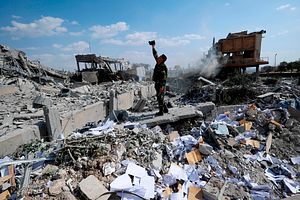On April 14, in retaliation for a suspected poison gas attack in Syria allegedly associated with the Assad regime, the United States, France, and Britain launched airstrikes targeting what Washington claimed were chemical weapons facilities in Syria.
China’s Foreign Ministry immediately issued a statement on the same day, opposing “the use of force in international relations” and “any unilateral military action bypassing the [United Nations] Security Council.” China urged all parties involved — which would also include Russia, the Assad regime’s major international backer — to “resolve the issue through dialogue and negotiation.”
Regarding the suspected chemical weapons attack in Syria, the Foreign Ministry statement said that “a comprehensive, impartial, and objective investigation should be carried out to reach a reliable conclusion that can stand the test of time.”
“Yet before that, a prejudgment should not be made, ”it added.
Meanwhile, China, together with Bolivia, supported a Russian proposal to condemn the airstrikes on Syria in the UN Security Council. With eight members of the Security Council voting against it, the Russian resolution failed.
Apart from the Chinese government’s active response, China’s citizens have shown unusual enthusiasm toward the Syrian issue this time.
Furthermore, it’s not only scholars and experts on foreign affairs following the development and expressing their opinions; a large number of ordinary netizens have also been actively commenting on the issue on China’s most important social media platforms, Weibo and Wechat. Considering that most Chinese people have very limited knowledge about the Middle East, there are several reasons that could explain their attention to this development.
First, the decision to launch airstrikes on Syria is indeed debatable. In contrast to the Chinese government’s firm yet still relatively reserved stance, Chinese netizens have been obviously divided into two sides — one strongly against the airstrikes and the other for it. Those against the strikes have argued that the United States, France, and Britain launched their military retaliation without even waiting for the outcome of an independent investigation. Nor did the three countries issue substantial evidence to demonstrate that Assad’s administration was indeed behind the attack, even though France claimed that “reliable intelligence” could confirm it. As for the side that supports the airstrikes, their main argument is that the use of chemical weapons on civilians crossed a “red line.”
However, what has caught most Chinese people’s attention is not the facts of the chemical weapon attack itself but the “conspiracy theories” and nationalist sensationalism highlighted by Chinese media.
Xinhua, China’s state news agency, published a series of commentaries on Syria and posted them on the the second most eye-catching position — just below stories on Chinese President Xi Jinping — on its website. The most highlighted commentary, titled “Why is the United States so eager to use force against Syria,” argued that the United States made the hasty decision because it doesn’t want to see “Assad stabilize his power.” It also argued that the Trump administration aims to “divert local people’s attention from domestic troubles to foreign affairs.”
Global Times — another China’s state-run newspaper famous for its skill at agitating nationalism among Chinese readers — also published a series of reports on the Syrian issue.
One article, titled “This photo of the Syrian diplomat has deeply touched Chinese people’s pain point,” has won itself more than 11,000 comments by Chinese netizens and has been widely reposted by numerous other websites. This article showed a photo of Syria’s ambassador to the United Nations, Bashar Jaafari, sitting sorrowfully in front of the window in the United Nations. Saying that the photo was taken on April 10, after Jaafari made a powerful speech against the Western powers, the article claimed that the photo reminded Chinese citizens of China’s history of humiliation by foreign countries.
“A weak country has no diplomacy,” the article concluded. “As a hundred years have passed, China is no longer that [weak] China, but the world is still that world.”
Besides the hype of China’s state media, a third factor — hidden but equally significant — can’t be ignored either. Chinese top censors have been obviously lenient toward or even supportive of the nationwide discussion of the Syrian issue. So far, no obvious censorship has been targeted at any opinion related to the airstrikes — whether the sentiment has been supportive or not. That indicates that the netizens’ discussions have been in line with the national hidden political agenda.
By contrast, in recent days, a wave of discussions on social movements in support of LGBT rights and against sexual harassment had dominated China’s social media, and those discussions were harshly censored. Perhaps what Chinese top censors are doing now is also an attempt to “divert local people’s attention from domestic troubles to foreign affairs.”

































